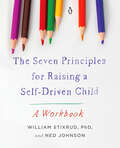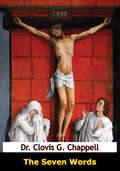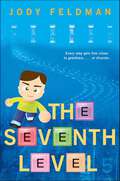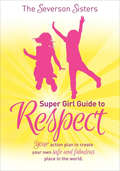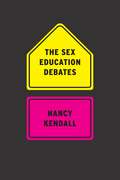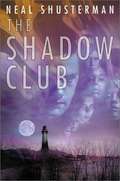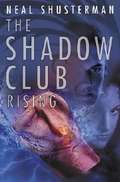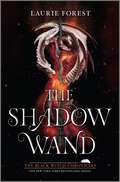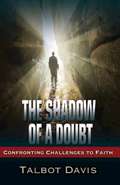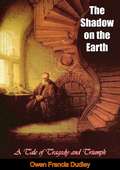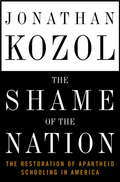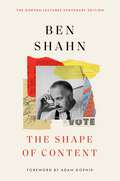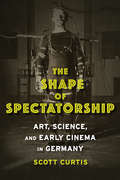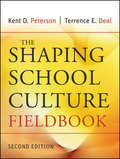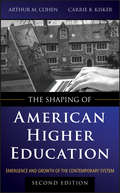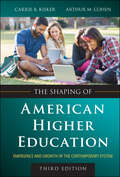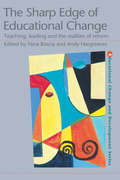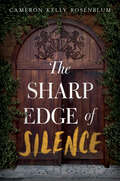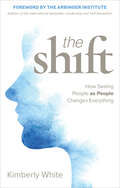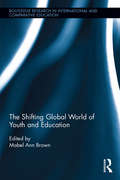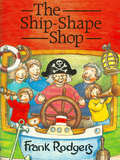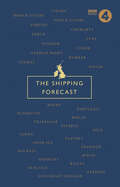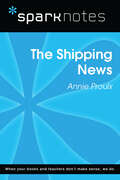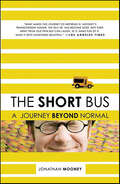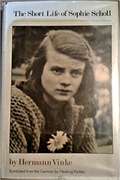- Table View
- List View
The Seven Principles for Raising a Self-Driven Child: A Workbook
by Ned Johnson William Stixrud PhDFrom the authors of What Do You Say? and The Self-Driven Child, a workbook of vital practices and step-by-step resources for parents striving to raise self-motivated, secure, and joyfully driven childrenA guide to move from understanding the science and value behind nonanxious parenting to developing and sharpening the essential skills parents need to be a trusted resource for growing kids.Authors William Stixrud and Ned Johnson have watched firsthand as the crisis around education and the mental health crisis in childhood have converged in the postpandemic years. Their book The Self-Driven Child was ahead of the curve in addressing the way these forces converge in adolescents at pivotal moments as children develop their sense of autonomy, ambition, self-discipline, and learning style. As the authors have continued to lecture on the book&’s subject, parents have again and again homed in on the value of the model dialogues and practice prompts.Using material from their current work with parents and children, and pulling essential principles from the science in The Self-Driven Child, this workbook guides parents to develop the practice of being a nonanxious presence in children&’s lives, as well as introducing essential skills for navigating the pressure cooker of school. With prompts to help parents diagnose and rewire their instinctual responses to stressful situations, exercises to give them the language to communicate clearly and calmly, and lists to keep anxiety responses in check and big-picture goals in view, this workbook will bring peace and clarity to parents and educators seeking to support the unique path each child traverses on the road to growing up.
The Seven Words
by Clovis G. ChappellTHE WORDS OF JESUS ON THE CROSS REVEAL THE HEART OF CHRISTIAN FAITHWith his characteristic method of relating Scripture to daily living, Dr. Chappell provides numerous illustrations—from everyday life, from personal experiences, from experiences of other ministers, from current world events, from other parts of Scripture, from history, from literature—that make the deep truths of the Crucifixion meaningful for present-day men and women.
The Seventh Level
by Jody FeldmanLauer Middle School has a super-secret society—The Legend. No one knows who is in it. Or how they pull off the spectacular schoolwide events.Seventh grader Travis Raines may be about to find out. A shiny blue envelope marked For Your Eyes Only mysteriously appears in his locker. You have been chosen, the message says. But if Travis is to become Legendary, he must first solve a series of mind-bending puzzles and complete their challenges. Then he needs to stay out of trouble. The assistant principal has her eye on him. So do his parents. And even if he does all that's asked of him, Travis still has one question: is the message really from the Legend?
The Severson Sisters Super Girl Guide to Respect: Your Action Plan to Create Your Own Safe and Fabulous Place in the World (Super Girl Guide Ser.)
by The Severson SistersDear Severson Sisters Super Girl: We know that growing up can sometimes feel like a maze. The middle-school maze is probably the biggest maze of all. There are friends who may not always treat you like a friend. There are days you want to try something totally new, but don’t know how to. There are days you say things about yourself that are not super nice. Severson Sisters created The Super Girl Guide To: Respect because we work with girls like you. We help girls like you through the maze. We’ll help you jump-start your confidence, learn what respect is all about, and have so much fun along the way! And the best news of all, The Severson Sisters Super Girl Guide To: Respect helps you understand what to do if you’re being bullied. We give you tips on what to do if you see a friend being bullied. And we help you understand if you are bullying someone else. Every Super Girl needs a trusted adult Supporter. Find yours, and together you’ll feel so much better about the middle-school maze to life. It’s best if you sit down with your Supporter as you work through The Severson Sisters Super Girl Guide To: Respect. Your Super Girl Supporter will ask you questions about school, your friends, and your after-school activities. Super Girls are all about respect, and you’re going to have so much fun once you start this guide. Enjoy it and celebrate all things super about you!
The Sex Education Debates
by Nancy KendallEducating children and adolescents in public schools about sex is a deeply inflammatory act in the United States. Since the 1980s, intense political and cultural battles have been waged between believers in abstinence until marriage and advocates for comprehensive sex education. In The Sex Education Debates, Nancy Kendall upends conventional thinking about these battles by bringing the school and community realities of sex education to life through the diverse voices of students, teachers, administrators, and activists. Drawing on ethnographic research in five states, Kendall reveals important differences and surprising commonalities shared by purported antagonists in the sex education wars, and she illuminates the unintended consequences these protracted battles have, especially on teachers and students. Showing that the lessons that most students, teachers, and parents take away from these battles are antithetical to the long-term health of American democracy, she argues for shifting the measure of sex education success away from pregnancy and sexually transmitted infection rates. Instead, she argues, the debates should focus on a broader set of social and democratic consequences, such as what students learn about themselves as sexual beings and civic actors, and how sex education programming affects school-community relations.
The Shadow Club
by Neal ShustermanThe "number ones" always get the glory. They win the races and take the gold medals, leaving the second-place kids behind in the dust. For Jared and Cheryl, nothing is worse than being second best, hidden behind someone else's shadow. Their idea to form a club of second-best kids seems harmless enough at first - they just want to air their bad feelings about their archrivals. But when that isn't enough to keep everyone interested, Jared suggests that the Shadow Club members play anonymous practical jokes on each other's enemies. Little does the Shadow Club know, however, that Tyson McGaw, the school reject, is eavesdropping . . . and little do they know how dangerous pranks can get. . . . If you've ever lost a race by a fraction of an inch; if you've ever suffered the agony of defeat; if you've ever been second best at anything. Then you've already won your membership in the Shadow Club, and you're bound to become wrapped up in this chilling page-turner.
The Shadow Club Rising
by Neal ShustermanThe Shadow Club doesn't exist anymore. The group of second-best kids used to play anonymous practical jokes on their rivals, until things spiraled out of control. Now Jared and the ex-Shadow Club members are having a hard time shaking their reputation. And when the new golden boy at school is the victim of a series of nasty pranks, everyone's convinced Jared is to blame. Determined to prove his innocence, Jared soon becomes wrapped up in a nightmare worse than anything the Shadow Club ever caused.
The Shadow Wand (The Black Witch Chronicles #3)
by Laurie ForestHER WORLD-ALTERING SECRET CAN’T BE HIDDEN MUCH LONGERElloren Gardner hides the most powerful secret in all Erthia—she is the Black Witch of Prophecy, and destined to triumph…or be used as the ultimate weapon of destruction.Separated from everyone she loves, isolated and hunted, Elloren must turn to the last person she can trust—her fastmate, Commander Lukas Grey. With the Mage forces of Gardneria poised to conquer all of Erthia, Elloren has no choice but to ally with Lukas and combine their power to keep herself out of the hands of Gardnerian leader Marcus Vogel…the holder of the all-consuming Shadow Wand.With just weeks to train to become a warrior, and no control over her magic, Elloren finds unexpected allies among those under orders to kill her. It’s time to step up. To fight back. And to forge onward through the most devastating loss yet.
The Shadow of a Doubt: Confronting Challenges to Faith
by Talbot DavisWe all have doubts. Throughout this five-week study, Davis invites you to acknowledge and confront your doubts about your Christian faith. Each chapter focuses on a different biblical story that illustrates a key insight into doubt and its effects on our faith. By bringing our doubts out of the shadows and into the light, we have an opportunity to experience an authentic faith seeking understanding. Discussion questions at the end of each chapter are designed to help leaders of small groups. Also available when purchasing the book is access to a free video trailer and an audio recording of the author's sermons as another way to experience the weekly message.
The Shadow on the Earth: A Tale of Tragedy and Triumph
by Owen DudleyShadow of the Earth is the second of Father Dudley’s books on the problems of human happiness.It is a novel which endeavors to furnish an answer to the problems of Evil.A young man is injured in the mountains and is taken to a monastery where he is cared for by Brother Anselm, one of the monks. In the shock of discovery that he is crippled for life, he denounces God and turns against the friendly monk. An atheist and a Christian Scientist offer the consolation of their beliefs, but he finds at last in Catholicism, as taught and practiced by Brother Anselm, the faith he needs to face life.“A book full of strength and beauty.”—The Signet“A beautiful piece of work; it shows its author as both philosopher and true artist in words.”—Catholic World
The Shame of the Nation: The Restoration of Apartheid Schooling in America
by Jonathan KozolThe author of Savage Inequalities argues that US schools are now more segregated than when the Supreme Court made its landmark Brown v. Board of Education desegregation ruling (1954). This veteran activist researcher traces the roots of the problem, faults efficiency models such as the No Child Left Behind Act, and supports a constitutional amendment making education a fundamental right. This provocative treatment finds a glimmer of hope in a district's rejection of quick-fix remedial programs. Annotation ©2006 Book News, Inc. , Portland, OR (booknews. com)
The Shape of Content (The Charles Eliot Norton lectures)
by Ben Shahn“The clearest, most forceful statement on art by an artist of our time that I have read.” —Frank Getlein, New RepublicAn illustrated guide to artistic creation from one of the twentieth century’s most provocative and expressive painters.Can art be taught? For the celebrated activist-painter Ben Shahn, the answer was a qualified yes. Any would-be artist can take a few courses and dip their toes in the water. But a true education goes far beyond the classroom.The Shape of Content, compiled from Shahn’s 1956–1957 Norton Lectures, appeals for artists to break the confines of formal instruction. In wide-ranging reflections on art history, the problems of form, and his own career, Shahn conveys the stubborn determination required to move beyond dilettantism and toward an authentic voice. But he delivers no easy formulas. Critics celebrate artists’ seemingly effortless moments of inspiration, yet genuine achievement is always the fruit of prodigious labor. To the perennial questions of “What shall I paint?” and “How shall I paint it?” Shahn replies: Live and think and try. Read endlessly, develop and test opinions, and above all, don’t stop painting.A figurative realist in an age of high abstraction and an unabashed leftist at the height of the Cold War, Shahn was never quite at home in his own time. The accessibility and popularity of his work, and his sometimes-unfashionable humanism, made him a frequent target of critics during his life. And yet it is precisely these features that have since cemented Shahn as a giant of twentieth-century art. Today, his lectures offer potent lessons for anyone who shares his belief in the power of art to change minds and contest injustice.
The Shape of Spectatorship: Art, Science, and Early Cinema in Germany (Film and Culture Series)
by Scott CurtisScott Curtis draws our eye to the role of scientific, medical, educational, and aesthetic observation in shaping modern spectatorship. Focusing on the nontheatrical use of motion picture technology in Germany between the 1890s and World War I, he follows researchers, teachers, and intellectuals as they negotiated the fascinating, at times fraught relationship between technology, discipline, and expert vision. As these specialists struggled to come to terms with motion pictures, they advanced new ideas of mass spectatorship that continue to affect the way we make and experience film. Staging a brilliant collision between the moving image and scientific or medical observation, visual instruction, and aesthetic contemplation, The Shape of Spectatorship showcases early cinema's revolutionary impact on society and culture and the challenges the new medium placed on ways of seeing and learning.
The Shaping School Culture Fieldbook
by Terrence E. Deal Kent D. PetersonWhen the bestselling books Shaping School Culture and The Shaping School Culture Fieldbook were first published, Kent D. Peterson and Terrence E. Deal described the critical elements of school culture-the purposes, traditions, norms, and values that guide and glue the community together. The authors showed how a positive culture makes school reform work and the companion Fieldbook included the tools needed to bring out the best in students, teachers, and the surrounding communityIn today's complex educational environment, new challenges have surfaced for school leaders who must grapple with issues of standards-based testing, school accountability, and student achievement. The second edition of The Shaping School Culture Fieldbook offers a companion to the newly revised edition of Shaping School Culture and includes an expanded version of Peterson and Deal's time-tested model to address the latest thinking on school culture and change. The Fieldbook offers a wealth of new ideas and approaches and includes new material on "toxic" environments with specific action plans. In addition, the book contains powerful new case examples for revitalizing school culture. The Shaping School Culture Fieldbook draws on the authors' extensive research and nationwide school contacts and includes hands-on strategies and exercises for helping school leaders: Uncover a school's hidden values, beliefs, and assumptions Think through and develop a school's mission and purpose Work out appropriate stories, metaphors, and symbols to represent a school Devise rituals and ceremonies for enriching the school experience Rethink leadership practices in light of educational and cultural needs Identify, transform, and heal a "toxic" educational cultureThis important resource will help school leaders understand, assess, and transform school culture for organizational success.
The Shaping of American Higher Education
by Cohen Arthur M. Kisker Carrie B.Similar to the first edition, The Shaping of American Higher Education combines historical and current events up to the mid 1990s. In this edition though, the revised text provides updated data and tables, new material on faculty, student admissions, and management practices, as well as a new chapter on the contemporary era. The book explores topics like curricular expansion, institutional growth, secular governance, and more. With end-of-chapter questions, this textbook presents a history of American higher education, with an emphasis on developments impacting current conditions, to students, professors, and practitioners.
The Shaping of American Higher Education: Emergence and Growth of the Contemporary System
by Carrie B. Kisker Arthur M. CohenAn updated analysis of the forces shaping contemporary higher education in America Combining historical perspective with in-depth coverage of current events, The Shaping of American Higher Education offers an authoritative account of the past, present, and future of higher education in the United States. Readers will gain a thorough understanding of trends in student access and equity, faculty professionalization, curricular expansion, institutional growth, college administration and governance, public and private funding, outcomes, and accountability. Much has happened in American higher education since the 2nd edition of this text was published in 2009. This streamlined new edition discusses contemporary colleges and universities within a broader societal context characterized by political polarization, social fragmentation, and distrust of government and public institutions, and illustrates how twenty-first century institutions are grappling with issues related to diversity, equity, inclusion, and social justice; responding to decades of state and local disinvestment by engaging in public-private partnerships and other entrepreneurial ventures; and shedding historical precedents to educate and train learners in new ways. The book concludes with predictions for the future and an analysis of the challenges and opportunities that await higher education leaders, faculty, students, and policymakers. Readers of The Shaping of American Higher Education will: Gain an awareness of how history has shaped—and has been shaped by—institutions of higher education Develop an in-depth understanding of current issues in colleges and universities, including student activism and free speech; declining numbers of full-time and tenured faculty; equity-driven approaches to teaching and learning; new pathways to degrees and non-degree credentials; increasingly complex governance and administrative structures; entrepreneurial approaches to revenue generation and fiscal sustainability; and heightened pressures for student and institutional accountability. Benefit from a comprehensive analysis of how American higher education has evolved from the first colonial colleges to a complex system of liberal arts colleges, research universities, broad-access and Minority-Serving Institutions, community colleges, and for-profit institutionsThe Shaping of American Higher Education is required reading for higher education administrators, faculty, scholars, and policymakers and makes an excellent textbook for use in graduate and undergraduate courses on higher education.
The Sharp Edge of Educational Change: Teaching, Leading and the Realities of Reform (Educational Change And Development Ser.)
by Andy Hargreaves Nina BasciaThe Sharp Edge of Educational Change conveys the realities of reform as they affect educators' practice. The collected chapters each focus on particular current reform and reveal the technical and logistical complications, social and political dynamics, cognitive disjunctures and limitations, and emotional demands of reform. In so doing, they provide new and rich conceptual perspectives on the contemporary nature of teachers' and administrators' work in classrooms, schools and other educational settings.
The Sharp Edge of Silence
by Cameron Kelly RosenblumTradition meets People Like Us in this timely and haunting YA contemporary standalone that tackles the contagious nature of toxic masculinity at an elite New England boarding school clinging to its past, and the sexual assault that changes everything.WHO WILL YOU BE AT LYCROFT PHELPS?This is the question all Lycroft applicants want to be asked. It means they’ve been accepted to one of the most prestigious private high schools in the nation.Over 150 years is plenty of time for traditions to bake into the campus’s bricks and ivy. Ceremonies. Athletic rivalries. Secret societies. Pranks taken too far. But navigating it all will make Charlotte (perfect, straight-A student), Max (scholarship kid and STEM whiz), and Quinn (artist, dreamer, Lycroft legacy) question all they thought they knew about themselves…and the school.Especially when Quinn’s sexual assault becomes public and implicates one of the top-tier athletes on campus.Told in alternating perspectives, this gripping, fast-paced narrative is perfect for readers looking for their next empowering #MeToo read.
The Shift: How Seeing People as People Changes Everything
by Kimberly WhiteA Simple yet Profound ShiftSeeing people as people is an idea so simple you'll swear you've heard it a million times but so profound you'll never stop learning from it. Kimberly White discovered it in a chain of nursing homes whose leaders, nurses, and housekeepers saw their patients, not as tasks to be ticked off a to-do list, but as valuable human beings.White helps you to this transformative shift with warm encouragement, insightful guidance, and powerfully moving, true accounts of extraordinary human goodness.
The Shifting Global World of Youth and Education (Routledge Research in International and Comparative Education)
by Mabel Ann BrownThe Shifting Global World of Youth and Education explores how increasing migration and population changes are having an unprecedented impact on global education. Given that the number of children of migrant background is growing internationally, there is a need for increasing awareness of the educational attainment and cultural integration of this population group. This book presents international perspectives on migration and youth and analyses what kinds of effects such demographic changes are having on educational systems around the world. The chapters in this volume provide a fascinating insight into how countries around the world are dealing with loss or growth in their young population as well as changes to their education systems. Written by specialist academics from the relevant country, the book covers Cuba, Lithuania, the United Kingdom, the United States, Finland, Greece, Germany, Austria, Hungary, Latvia, China, Australia, India, Italy and Poland. Taking into consideration the countries’ social and political context, the chapters discuss educational issues surrounding curriculum, assessment and the opportunities available for the support of young people. Conclusions are drawn about what could be done in the future for the benefit of both the migrant and the existing populations. The Shifting Global World of Youth and Education will be of great interest to academics, researchers and postgraduate students in the disciplines of education, sociology, political sciences and social work. The book will also give secondary teachers, teaching assistants, social workers and youth workers the opportunity to reflect on their role within a national and international context.
The Ship-Shape Shop
by Frank RodgersSalty's junk shop is Janet, Sam and Granny's favourite shop. But snooty Mrs Grimbly-Whyte wants it knocked down, and the town council agree with her. But 'never say die' is Granny's motto ... she comes to the rescue with a brilliant plan and soon the whole family is busy creating a wonderful new shop.
The Shipping Forecast: A Miscellany
by Nic ComptonThe rhythmic lullaby of ‘North Utsire, South Utsire’ has been lulling the nation’s insomniacs to sleep for over 90 years. It has inspired songs, poetry and imaginations across the globe – as well as providing a very real service for the nation’s seafarers who might fall prey to storms and gales. It has inspired everyone from Seamus Heaney to Radiohead, and from Radio 4 announcers to the writers of Keeping Up Appearances. In 1995, a plan to move the late-night broadcast by just 12 minutes caused a national outcry and was ultimately scrapped.Published with Radio 4 and the Met Office, The Shipping Forecast is the official miscellany for seafarers and armchair travellers alike. It features fascinating facts alongside lyrics from Seamus Heaney, Carol Ann Duffy, Radiohead and more. From the places themselves – how they got their names, what’s happened there through the ages – to the poems and parodies that it’s inspired, this is a beautifully evocative tribute to one of Britain's – and Radio 4's – best-loved broadcasts.
The Shipping News (SparkNotes Literature Guide Series)
by SparkNotesThe Shipping News (SparkNotes Literature Guide) by Annie Proulx Making the reading experience fun! Created by Harvard students for students everywhere, SparkNotes is a new breed of study guide: smarter, better, faster. Geared to what today's students need to know, SparkNotes provides: *Chapter-by-chapter analysis *Explanations of key themes, motifs, and symbols *A review quiz and essay topicsLively and accessible, these guides are perfect for late-night studying and writing papers
The Short Bus: A Journey Beyond Normal
by Jonathan MooneyA young man once called unteachable journeys across America to investigate the lives of those, like himself, who are forced to create new ways of living in order to surviveLabeled "dyslexic and profoundly learning disabled with attention and behavior problems," Jonathan Mooney was a short bus rider—a derogatory term used for kids in special education and a distinction that told the world he wasn't "normal." Along with other kids with special challenges, he grew up hearing himself denigrated daily. Ultimately, Mooney surprised skeptics by graduating with honors from Brown University. But he could never escape his past, so he hit the road. To free himself and to learn how others had moved beyond labels, he created an epic journey. He would buy his own short bus and set out cross-country, looking for kids who had dreamed up magical, beautiful ways to overcome the obstacles that separated them from the so-called normal world.In The Short Bus, his humorous, irreverent, and poignant record of this odyssey, Mooney describes his four-month, 35,000-mile journey across borders that most people never see. He meets thirteen people in thirteen states, including an eight-year-old deaf and blind girl who likes to curse out her teachers in sign language. Then there's Butch Anthony, who grew up severely learning disabled but who is now the proud owner of the Museum of Wonder. These people teach Mooney that there's no such thing as normal and that to really live, every person must find their own special ways of keeping on. The Short Bus is a unique gem, propelled by Mooney's heart, humor, and outrageous rebellions.
The Short Life Of Sophie Scholl
by Hermann Vinke Ilse AichingerThe biography of the twenty-one year-old German student who was put to death for her anti-Nazi activities with the underground group called the White Rose.
